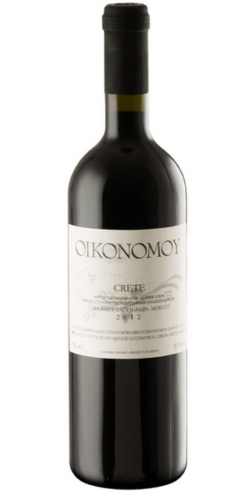
Our Rating

Crete
Red Blend
One of the most oft-used terms to describe winemaker Yiannis Economou is enigmatic because much of his winemaking methods are shrouded in secrecy. Yiannis has an old-school method of doing things. Everything is done on his own timetable, and he isn’t married to marketing timelines or pushing a certain number of bottles per vintage.
He does not make tech sheets for his wines, and as one wine buyer discovered on a trip to Economou’s farm and cellar in Crete, the entire operation has the feel of a “CIA safe house” – no pictures within the cellar, please – rather than that of an in-demand producer.
While winemaker Economou does have a kind of mad scientist air about him, don’t let that demeanor fool you. Yiannis received his degree in enology from the Umberto School in Alba, and as a young winemaker, he trained at Chateau Margaux and with legendary Barolo producer Paolo Scavino.
It was while working in Bordeaux and Barolo that Yiannis was exposed to premiere Old World grapes. Being the curious experimenter he is, it didn’t take long for the young winemaker to wonder how grapes like Cabernet Sauvignon and Merlot might fare in his family’s vineyard in Crete.
Domaine Economou has three vineyard sites in the towns of Ziros, Katsidoni, and Etia, which lay within the seaside municipality of Sitia. These vines were planted by Yiannis’ grandfather roughly 600-650m above sea level, and today they are between thirty and seventy years old.
Like many boutique vineyards in Greece, the vines at Domaine Economou were planted to indigenous varieties like Liatiko, Mandilari, Vilana, and Thrapsathiri.
While the vineyard is famous in Greece because of its association with Yiannis, it is also the only vineyard in the entire Mediterranean region to have a local clone of the Liatiko grape, which is a rare black-skinned grape. According to one of Domaine Economou’s importers, DNS Wines, “…this small-berried fruit diverges greatly from other Liatikos in the central and western parts of the island.”
Getting your hands on a bottle of Domaine Economou can be challenging. This ultra-low production winery produces just 1,000 cases of wine a year, many of which stay within Europe. Production is by design constrained. The ungrafted heritage vines are naturally low yielding due to their age, and they are dry-farmed.
Not only that but Economou is known for holding onto his bottles for an exceptionally long time. There are years when the winery will release no wines at all. Yiannis explains it best when he says:
“Within this framework, the time of maturing in the bottle does not necessarily keep up with the standards of other wineries. The time of maturation may differ among wines from different vintages depending on their quality. Thus, a wine from a good year may stay in the cellar for a long time (even a decade in some cases) until the producer determines whether or not it should be marketed. So, by the time the wine is released, consumers are able to evaluate and assess the wine based on its progress, exactly as they would do with some other well-known wines of the world.”
Your best bet to purchase one of these wines is with a source with some clout in the industry, like SommSelect or K&L Wine.
Hard-to-acquire wines like the ones produced by Domaine Economou come with a lot of hype: sometimes, they live up to the fanfare, and sometimes they don’t. We have to say; after trying this Greek producer, we understand why wine lovers wait with bated breath for these releases.
After aging for ten years, the 2012 Domaine Economou has a deep tawny color. The nose is a medley of earth, dark fruits, and leather. Plum, black cherry, and notes of concentrated raisin rise from the glass.
This Cabernet-Merlot blend in the hands of Economou is enticing, and the palate is rich but balanced. Expressive black cherry, prune, and raisin lead the way, followed by subtle, grounded notes of wet gravel, earth, and ever-so-sweet tobacco.
This Greek wine is interesting all the way around. Give it a try if you see it on a restaurant wine list or in a wine shop, you won’t be disappointed.
Greece
Crete
Red Blend
13.5
Todd Mathis
1 Hour
Now to 2030
DOMAINE ECONOMOU


All things wine, and food you could ever need or want — straight to your email!